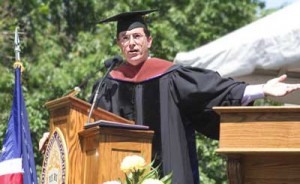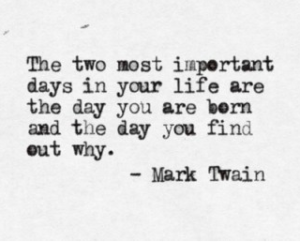It’s that special time of year when protests erupt over commencement speakers at various colleges and universities around the country. Then editorial writers and talking heads blather endlessly about the subject, and comment sections on web sites erupt in abuse and foolishness.
 I’ve watched the yearly uproar about commencement speakers being invited (or uninvited) with disappointment. Why? Because the discussion is consistently off base.
I’ve watched the yearly uproar about commencement speakers being invited (or uninvited) with disappointment. Why? Because the discussion is consistently off base.
One thread that comes up over and over is that students protesting a speaker’s invitation interfere with free speech. That’s just idiotic, and completely misunderstands the Bill of Rights. Someone like Dick Cheney, for instance, is free to speak about his beliefs, his past, his hopes and dreams, his view of foreign affairs, whatever he likes anywhere he wants to. And he does. He’s a public figure and can appear on TV talk shows, can publish Op Ed pieces, blogs, essays and books.
But the First Amendment says nothing about people who are invited to speak somewhere and are paid to do so. It specifically refers to government intervention in individual expression. That’s just not the case where a speaker proves controversial and campus protests arise.
Just as foolish as invoking “free speech”: the noxious moralizing about how students should be open to a free expression of ideas. The Washington Post editorial board hasn’t been alone in taking that tack, but are they for real? After four years of college, you don’t want a lecture in the middle of a grueling, dull, long ceremony in the heat–and you shouldn’t get one. Some schools even have two speakers from opposite political sides of a question to “promote open discussion.” What a joke!
 Commencement speeches aren’t seminars or workshops with Q&A. They’re supposed to be inspiring and entertaining. Funny, if possible. They’re throwaway, forgettable, a moment’s ornament as Edith Wharton put it in another context. And that’s okay, because graduation is about transitions, about moving on, about celebration. The ceremony isn’t an intellectual milestone for anyone involved. It’s not meant to go down in history, and the speaker sure isn’t Moses coming down from the mountain top.
Commencement speeches aren’t seminars or workshops with Q&A. They’re supposed to be inspiring and entertaining. Funny, if possible. They’re throwaway, forgettable, a moment’s ornament as Edith Wharton put it in another context. And that’s okay, because graduation is about transitions, about moving on, about celebration. The ceremony isn’t an intellectual milestone for anyone involved. It’s not meant to go down in history, and the speaker sure isn’t Moses coming down from the mountain top.
Academic freedom doesn’t suffer and nobody’s rights are interfered with if someone gets invited at a very hefty fee to speak to a graduating class of students, and is suddenly uninvited. Free exchange of ideas? What a laugh. The only exchange is the speech the speaker gives and the check that speaker leaves with or gets in the mail.
 Lev Raphael is the author of the suspense novel Assault With a Deadly Lie and 24 other books in many genres which you can find on Amazon and Barnes & Noble.
Lev Raphael is the author of the suspense novel Assault With a Deadly Lie and 24 other books in many genres which you can find on Amazon and Barnes & Noble.
 3–Because there are apps for everything.
3–Because there are apps for everything. 5–Because all you need is passion, patience, and a fondness for rejection–just like stalkers.
5–Because all you need is passion, patience, and a fondness for rejection–just like stalkers. 9–Because every other writing blog filled with writing tips tells you so.
9–Because every other writing blog filled with writing tips tells you so. Lev Raphael is the author of Writer’s Block is Bunk and 24 other books in a wide range of genres from memoir to mystery.
Lev Raphael is the author of Writer’s Block is Bunk and 24 other books in a wide range of genres from memoir to mystery.


